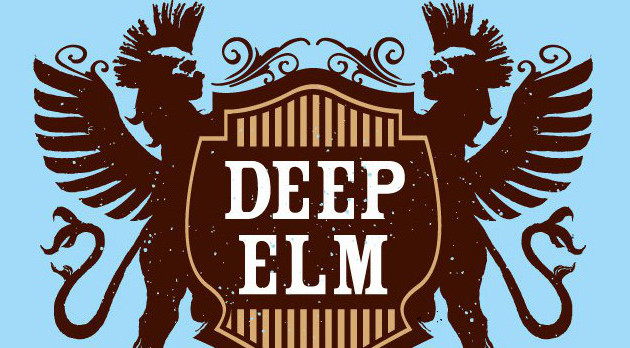It’s hard to be an independent record label in 2014. Between the slow, fluctuating, apparent demise of the CD, the hyper-commercialisation of alternative cultures and the fact that the average modern music consumer has the attention span of a five year old after a can of Monster, it’s a struggle for even the most robust, stubborn indie label to stay indie and stay functional. Today, the decision of a young person deciding to focus their career on working with and financing small bands is seen as admirable – it’s a sweet idea, but they’ll eventually give up and get a real job. However, there’s one small part of me that likes to think that anyone can achieve their dreams if they work hard enough. Somewhere at the back of my mind, I like to think that if I decided to take a leap into the music industry, that maybe I could make it work.
Deep Elm Records is one of the main reasons that we can still have faith in the idea of independent music being a lifestyle choice rather than a hobby. The record label, in action since 1995, has been the home of wonderful bands such as Lights & Motion, The Appleseed Cast, Brandston and many more. The label’s catalogue boasts over 200 releases and it’s website claims to be ‘fiercely independent’. Deep Elm certainly is as independent as a label comes. After frequent refusals to become subsidised by any major label, the collective has made all 200+ of it’s releases available as ‘name your price’ online. Of course, this is a daring move for a label lacking in major financial support however, as with everything else about Deep Elm, it’s an admirable move. Not only is this label one of the few truly independent record labels that exists today, it’s changed the definition of what it means to be an indie label.
Our culture these days means it’s hard to fight the mainstream. It’s hard for the indie kids to stay true to the D.I.Y ethics that draw them to bands that can’t bring in enough of a crowd to fill a tiny, local pub. That sense of camaraderie that comes from seeing a stranger wearing a Jimmy Eat World t-shirt or that idea that you can identify with someone based on whatever style or characteristic you associate with being ‘indie’ or ‘alternative’, that’s all but dead now. Given that every preppy tv show is filled with fans of Pavement, given that every other advertisement has an ‘indie’ vibe – it’s close to impossible to identify those who are purveyors of independent culture and those who bought it in Topshop. And, yeah, that’s something that indie kids are mocked and ridiculed for. The fact that we don’t like the idea that Miley Cyrus could be a Death Cab For Cutie fan is seen as pretentious; naysayers seen as assholes who sweat really stupid, small stuff. Maybe it is us sweating the small stuff, but I honestly don’t care if I seem like a stereotype for feeling a certain way.
The hyper-commercialisation of everything means that it’s close to impossible to have a sense of ownership over anything any more. If you’re passionate about vintage clothes, vinyl, photography, indie rock, dance, gothic style, urban style, metal, post-modernism, art, comic books, cult movies, emo, rave, motorbiking, skateboarding, extreme sports, vampires, the 60s, the 70s, the 80s, the 90s, sci-fi… whatever your sub-culture, it’s pretty likely that it’s been claimed by an up and coming pop star and that fourteen years olds are able to buy it in a local high street store. When you have these passions in a consumer culture which doesn’t encourage devoting yourself to anything specific but accessing small, watered down snippets of as many sub-cultures as possible, it becomes impossible to have any sense of ownership over your passions. It’s that ownership and feeling of being on the inside of something special which makes people feel alive and when you open that membership to everyone, in particular people who don’t really care, they become disenfranchised.
That’s what’s admirable about Deep Elm Records. Since 1995, we’ve witnessed the assimilation of the indie world. We’ve seen films like Juno take the box offices by storm. We’ve stood by as bands like Fall Out Boy and Paramore crawled out of basements and into the light of MTV and the Grammys. In these cases, it’s heartwarming to see that individuals who are passionate about arthouse cinema, indie music, hardcore punk and whatever else it is these folks do in their spare time, are able to break through to the public consciousness and have success. However, as I’ve said, this has made alternative tastes a valuable currency in the hyper-capitalist machine, ultimately devaluing it in the eyes of those who loved and lived by them in the first place. Not only have Deep Elm Records continually resisted the mainstream by turning down multiple takeover attempts, they’ve taken complete control of how to use the mainstream for their own benefits. Deep Elm’s initiative in licensing out music to companies such as Google, The Oscars, Apple Computers, Warner Bros, Universal, Red Bull and so on, is ingenious.
When a label is so militantly independent as Deep Elm is yet still manages to utilise big business to make money to channel back into their art (and the label’s arsenal has never been anything less than art) , it shows us how all indie labels don’t have to pull an Epitaph Records and release shitty, yet sellable music, using survival as an excuse. What Deep Elm teaches us is that when our favourite labels, magazines, whatever we follow and worship, water down their content or allow themselves to be caught up in the prevailing ideas of the mainstream, it’s not about a desperation to ensure that they stay alive to provide us with content (even if that content is unrecognizable as the stuff we originally fell in love with). What it comes down to is people allowing financial gain to completely override the passion and ethics that started them off on a road of DIY culture, and when it’s our figureheads and tastemakers that give in to everything the DIY scene is at odds with, how are we suppose to feel the passion that they’re trying to sell to us?
Whilst the idea of a ‘sell out’ is something that is almost universally ridiculed by highbrow music critics, it’s an idea that is better applied to industry folks rather than musicians. A band can play whatever the fuck music they want, but unless they receive the right amount of attention from the industry, their music is fated to forever be that thing they used to do in college. Indie labels and indie media need to realise that whilst they might make a quick buck off releasing an electro-pop-crabcore album or by becoming a sub-label of a major label, the lasting value just isn’t there. As soon as the mainstream bubble bursts, that shitty album will be on sale for a euro in a bargain bin and that major record label will be focusing their money on whatever new fad has come their way. By then, the kids who supported you from the start will be lost and you’ll be just another victim of greed. Yeah, I guess that four or five years of rolling in money might buy you a fancy car or two, but you’ve not only completely alienated a whole generation of kids (remember back when you were one of those kids?), you’ve been left with a stained legacy. Kelly Doherty






